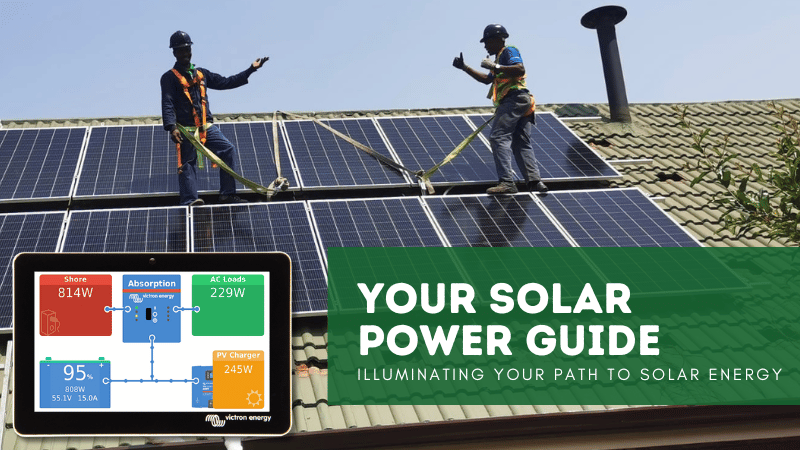Solar System Guide: Your Path to Efficient Solar Energy
Updated August 2024
Solar 101: The Basics
Solar energy is all about harnessing sunlight to power your home. Solar panels convert sunlight into DC power, not heat. For example, a 300W panel exposed to an hour of sunlight can produce up to 300W of energy. In sunny Johannesburg, you can expect 4-6 peak sun hours daily. Proper positioning is key; panels should face north in the Southern Hemisphere for maximum exposure. The power generated by the panels is managed by a charge controller, which charges the batteries. While solar panels and batteries produce and store DC power, your home appliances require AC power. The inverter converts DC to AC, which then powers your home’s Distribution Board and appliances.
Choosing the Right Solar System
When considering a solar system, start by defining your goals. Whether you want to avoid load shedding, reduce your electricity bill, or go green, there are several options:
- Off-Grid: Complete independence from Eskom. This system requires significant battery storage for cloudy days and nights. It’s costly (around R200,000 – R300,000) but eliminates grid dependence.
- Grid-Tied: You remain connected to Eskom, with no batteries required. Your panels directly power your appliances, reducing your electricity bill. Best for daytime users. However, during load shedding, the system shuts off. Costs range from R30,000 to R150,000.
- Hybrid: A popular choice in South Africa, combining the benefits of both systems. It includes a smaller battery bank for load shedding and daytime savings. Prices vary from R80,000 to R250,000, depending on usage.
- Backup System: This system includes only batteries and an inverter, charged from the grid. It’s cost-effective but offers no daily savings. Costs range between R25,000 and R100,000.
Energy Efficiency: A Key Consideration
Before investing in a solar system, consider reducing your energy consumption. Switching to a solar/gas geyser, gas stove, and LED lights can help. Avoid high-power appliances like heaters, as they are not ideal for solar systems. Prioritizing energy efficiency means a smaller, more affordable solar setup in the future.
Calculating Your Power Needs
To determine your power needs, use an energy meter (like a SCOUT) for a few weeks. This will help you understand your total and peak energy usage, allowing your installer to design the perfect system for your home.
Solar Panels and Placement
For the best results, install your solar panels on a north-facing roof in South Africa. Avoid shading, as it significantly reduces panel efficiency. East and west-facing roofs can work, but you may need more panels to compensate.
Choosing the Right Installer
Investing in a solar system is a big decision. Choose an installer with at least 5 years of experience, good references, and a PV Green Card. Look for associations with industry groups like SAPVIA. Avoid new, unproven companies. With a 13-year track record, we ensure quality workmanship and reliable service.
Guarantees and Warranties
Quality solar components come with solid guarantees. Inverters and chargers typically have 5 to 10-year warranties, lithium batteries around 10 years, and tier 1 panels can last 25-30 years.
Battery Life and Cycles
Not all batteries are created equal. Their lifespan is measured in cycles. Consider both the capacity and the number of cycles offered for the price. Look at the type of cell used in the battery, with CATL being a popular choice.
Brand Matters
Research the brands your installer recommends. Look for well-established reputations, strong warranties, and positive real-world reviews.
Monitoring Your System
Monitoring your solar system is like checking your car’s dashboard. It ensures optimal performance and alerts you to issues before they escalate. Monitoring also helps maximize your return on investment.
What Works with Solar
Not all appliances are solar-friendly. High-power devices like geysers and stoves can strain your system unless it’s designed to handle them. Consult your installer for the best advice.
Safety First
Proper installation with safety measures, such as fuses, breakers, and surge arrestors, is crucial. Ensure a master electrician signs off on your installation for peace of mind. Quality AC and DC protection will keep your home and family safe.
Financing Your Solar Project
Many banks offer solar loans. It’s a good idea to discuss your options with your banker to find the best financing plan for your needs.
Tax Incentives for Businesses
Businesses can benefit from tax incentives on solar installations. Refer to Section 12B of the Income Tax Act for details on accelerated depreciation allowances.
This Solar System Guide should help you navigate your solar journey. Remember, choosing a trusted installer, understanding your power needs, and opting for quality equipment are key to a successful solar installation.
Need help or ready to start? Contact the Cedar Solar Team at 011 794 4664 or email us at [email protected].





